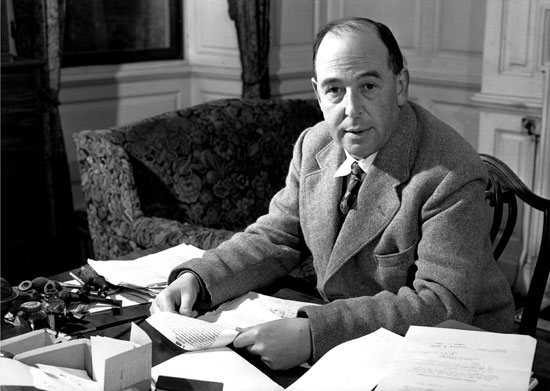
This one comes to us from Scott Dalton.
I thought I saw how stories of this kind [fairy tales] could steal past a certain inhibition which had paralyzed much of my own religion in childhood. Why did one find it so hard to feel as one was told one ought to feel about God or about the sufferings of Christ? I thought the chief reason was that one was told one ought to. An obligation to feel can freeze the feelings. And reverence itself did harm. The whole subject was associated with lowered voices; almost as if it were something medical. But supposing that by casting all these things into an imaginary world, stripping them of their stained-glass and Sunday school associations, one could make them for the first time appear in their real potency? Could one not thus steal past those watchful dragons? I thought one could. —C.S. Lewis, On Other Worlds, page 58
I’ll admit it: I struggle with feeling God’s love. You know, the whole I-can-sense-God-is-in-this-room-right-now-and-I-know-he-loves-me kind of feeling? It’s not that I don’t want to feel it—I definitely do. In fact, I’ve spent a decent amount of time praying to experience the feeling of God’s presence. I’ve urged him for it and I’ve pleaded for it. I’ve taken up “unconventional” methods like bartering, swearing, or working myself into an emotional frenzy, but it never seems to come as easily for me as it seems to for others. Some days, at best, it feels like I’m off at summer camp and God is at home sending me letters about gardening or excel spreadsheets while other kids are getting care packages full of sugary candy and scratch-and-sniff postcards.

When I’m struck down like this I usually turn to C.S. Lewis. For some reason I haven’t yet put my finger on, he seems to articulate ideas in a way that make more sense to me—like he is in my head. Perhaps it is somewhere at the junction of his acquaintance with grief (Isa. 53:3) and his uncanny ability to tell me “everything that I ever did” (John 4:29) that I find Lewis speaking to me in a way that is comforting and helpful. It usually makes me feel better. I’m not saying that Lewis is Jesus, I’m just saying that the parts of Lewis that I seem to be drawn to are remarkably similar to the parts that make Jesus the most attractive to me.
On a particular day I was struggling (read: trying and failing) with my acute inability to sense God and I came across the passage by Lewis quoted above. Call it a breakthrough or a mini-deliverance, but I finally felt like I was reading someone who experienced what I did—he just had words for it.
Lewis postulates that his inability to get “the feels” (as the kids would say) about who Jesus is and what he has done is actually because of his attempt to try to catch those feelings. In other words, Lewis is saying that he can’t catch lightning in a bottle, and neither can we. It turns out that the law can’t give what it demands: if the law says “feel this way” it simply has no power to produce the change—only Jesus can do that. Strikingly enough, Lewis says that even reverence can’t make Jesus real to us. And I thought of my prayers, and my contrived reverence, and all of my attempts to put myself back together again (note: I should have remembered Humpty Dumpty but I ignored him…) by creating an environment to experience God and to feel God’s presence.
At first it may seem that Lewis’ strategy is just another dolled-up version of contrived spirituality. He suggests that, at least for writing children’s books as fairy tales, one could learn to feel again by seeing new images without the stained-glass language of church. Sounds like more effort. But if you’ve read Lewis you know that he’s not one to abandon worshipping at church or even using religious language. Lewis is trying to get the reader to consider that what we need is not more deliberately created reverence and awe. Rather, we need a real encounter with Jesus to change our hearts and minds. I think Lewis said it best when he wrote a letter to a mother of a young boy who was worried that he may love Lewis’ character Aslan from The Chronicles of Narnia more than he loved Jesus:
Laurence can’t really love Aslan more than Jesus, even if he feels that’s what he is doing. For the things he loves Aslan for doing or saying are simply the things Jesus really did and said. So that when Laurence thinks he is loving Aslan, he is really loving Jesus: and perhaps loving Him more than he ever did before.
I don’t know who Laurence is, but I’m confident he gets my struggle. Because as soon as I begin to think how terrible of a person I am because I can’t feel God at the current moment, I begin to think of all of the things I love/sense instead (money, Amazon packages, good food, etc.) and it is completely depressing. At least Laurence is loving aspects of Aslan that look like Jesus; I’m pretty sure I’m just loving the Baals.
don’t know who Laurence is, but I’m confident he gets my struggle. Because as soon as I begin to think how terrible of a person I am because I can’t feel God at the current moment, I begin to think of all of the things I love/sense instead (money, Amazon packages, good food, etc.) and it is completely depressing. At least Laurence is loving aspects of Aslan that look like Jesus; I’m pretty sure I’m just loving the Baals.
When I read what Lewis said about the stained-glass language and when I thought about Laurence, I remembered that Jesus is the kind of king who dies for specific sins, troubles, and inabilities. A thought I hadn’t had in a while came to mind: maybe Jesus died for my inability to sense him — maybe he even sensed God’s presence perfectly for me.
Like Laurence, Lewis was the guide to the window through which I saw what God was really like. For Laurence, he found the person of Jesus typified in an unlikely place — a lion on the pages of the book. For me, it was a seeing afresh the Jesus that I found in the Scriptures as a result of what Lewis had written. Lewis was asking me to reimagine the Jesus who suffered and died not just for people two thousand years ago, but for me right now in the midst of this present inability to sense him. It turns out that my feelings don’t actually change what Jesus did.
If I’m honest, I can’t say that I’m much better at feeling God’s love or sensing his presence. But something that does make me feel is imagining Jesus, walking around somewhere in Galilee, thinking about me and feeling perfect communion with God knowing that one day he would give it to me. The more I thought about it I realized that’s the point: that the gospel is real regardless of how I feel or think about it. It’s an objective truth for a subjective reality. And that is good news.

COMMENTS
5 responses to “When Obligation Freezes the Feelings: Sensing God with C.S. Lewis”
Leave a Reply













Love this.
So good, Scott. Thank you!
And that Lewis quote – holy moly, i hadn’t heard it before.
Thanks, David! The quote was so arresting the first time I read it — it’s a great book.
Good word! “It turns out that my feelings don’t actually change what Jesus did.”
this is lovely.